
Zero Mostel performs “Tradition” in the 1964 Broadway production
My cousin Annette and I took our grandparents to see Fiddler on the Roof performed at Detroit’s beautiful Fisher Theater. The Google machine tells me this happened prior to the show’s Broadway debut, so it was either in 1963 or early 1964. We were lucky to see Zero Mostel in the role of Tevya. In retrospect, I wonder how much of the show my grandparents understood and wish we had been able to take them to the Yiddish version. Even though they were familiar with its source material, the Yiddish stories of Sholem-Aleichem, their command of English wasn’t great.
Despite the language barrier, our grandmother Alice was delighted with the performance, even if she didn’t understand all of it. She came from a family of klezmer musicians and her family name Klavir most likely came from the German word for piano, klavier. Music, singing, and dancing were in her soul, right up to the end of her life at age 93. I vividly remember her smiling and tapping her feet to the music throughout the show.
Our grandfather Philip, on the other hand, was a sweet, kind, and quiet man who had been dealt a tough hand in childhood. His mother died when he was young, and his father remarried soon after. Because the family was poor, at age ten he was sent away on his own to Riga to be apprenticed to a tailor. Eventually, he and his older brother and younger sisters came to America. He didn’t really know his half-siblings, some of whom likely were killed in the Holocaust. There was no singing, dancing, and celebrating in his life — only hard work. Thus, he sat stoically through the show and proclaimed when it ended, “It vasn’t like dat.”
I have seen several productions of Fiddler since that one, including our son’s fifth grade play in which he played Motel the Tailor and sang “Wonder of Wonders” to a cute little girl without making eye contact. I have always loved the show, even though I know it glamorizes the life in the shtetl my grandparents knew. But when I think of that original production with the amazing Zero Mostel, it is with a tinge of nostalgia and sadness, remembering how I shared this experience with my grandparents and cousin. With my grandparents’ passing, much of the tradition that Tevya sang about during the musical is lost, as faded from history as the pictures below.
As my grandfather would have said, it was more like this:
Boomer. Educator. Advocate. Eclectic topics: grandkids, special needs, values, aging, loss, & whatever. Author: Terribly Strange and Wonderfully Real.


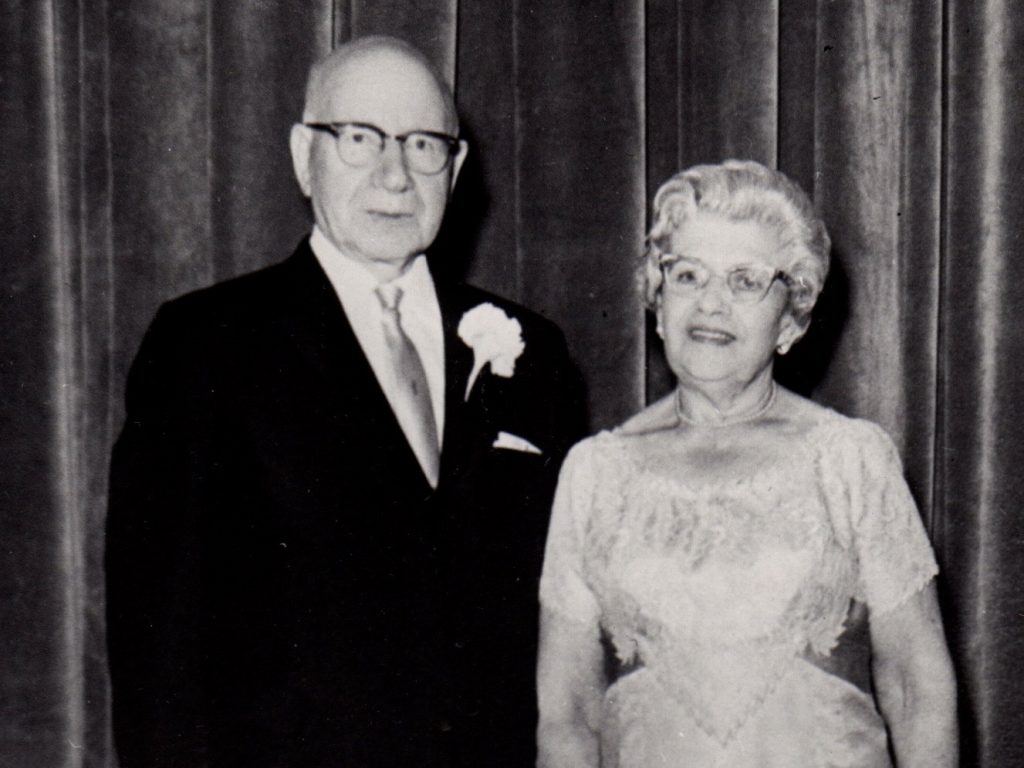
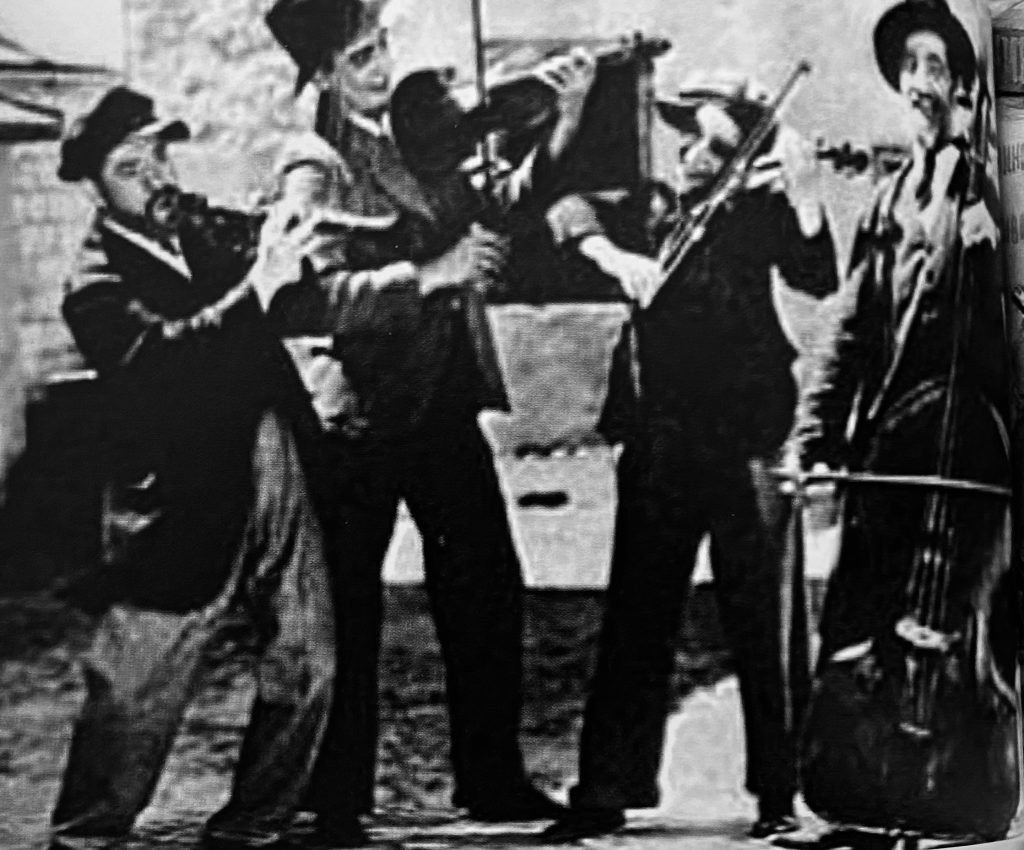
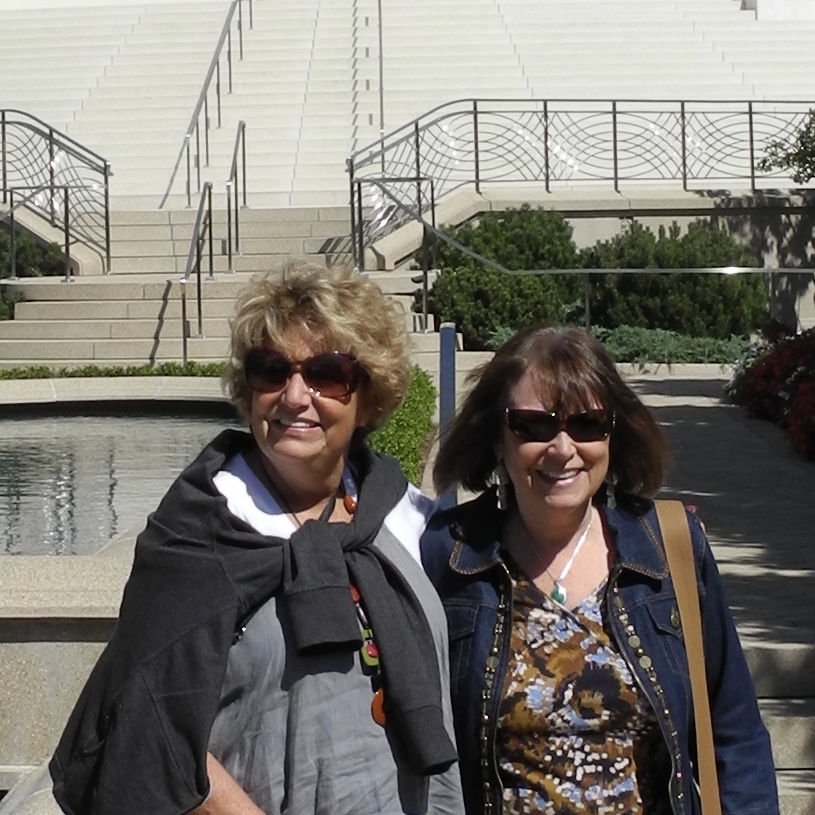
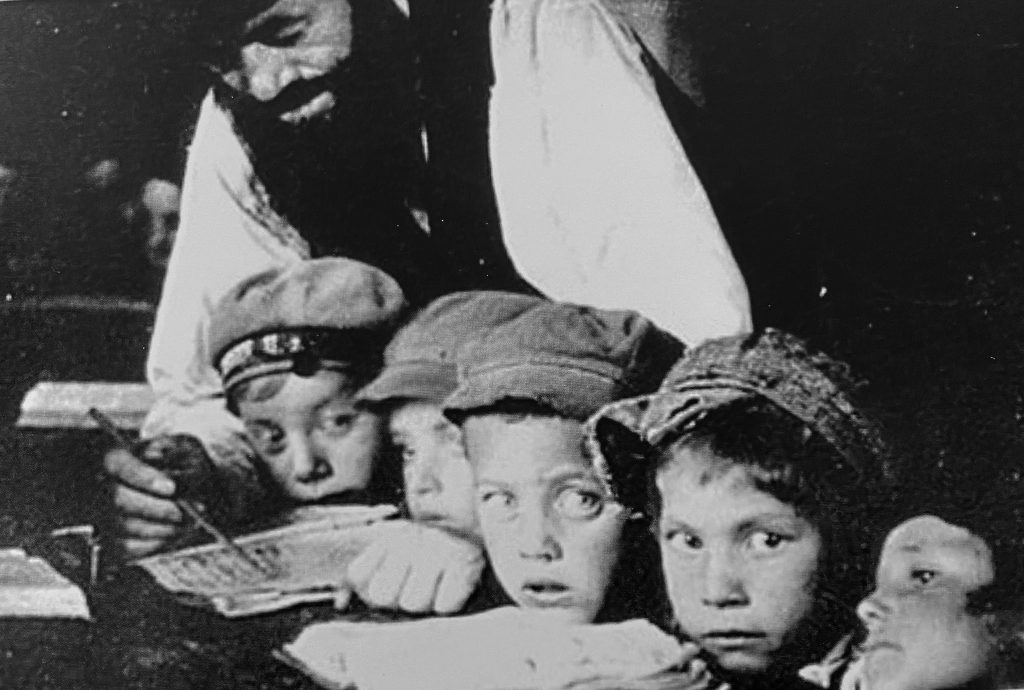
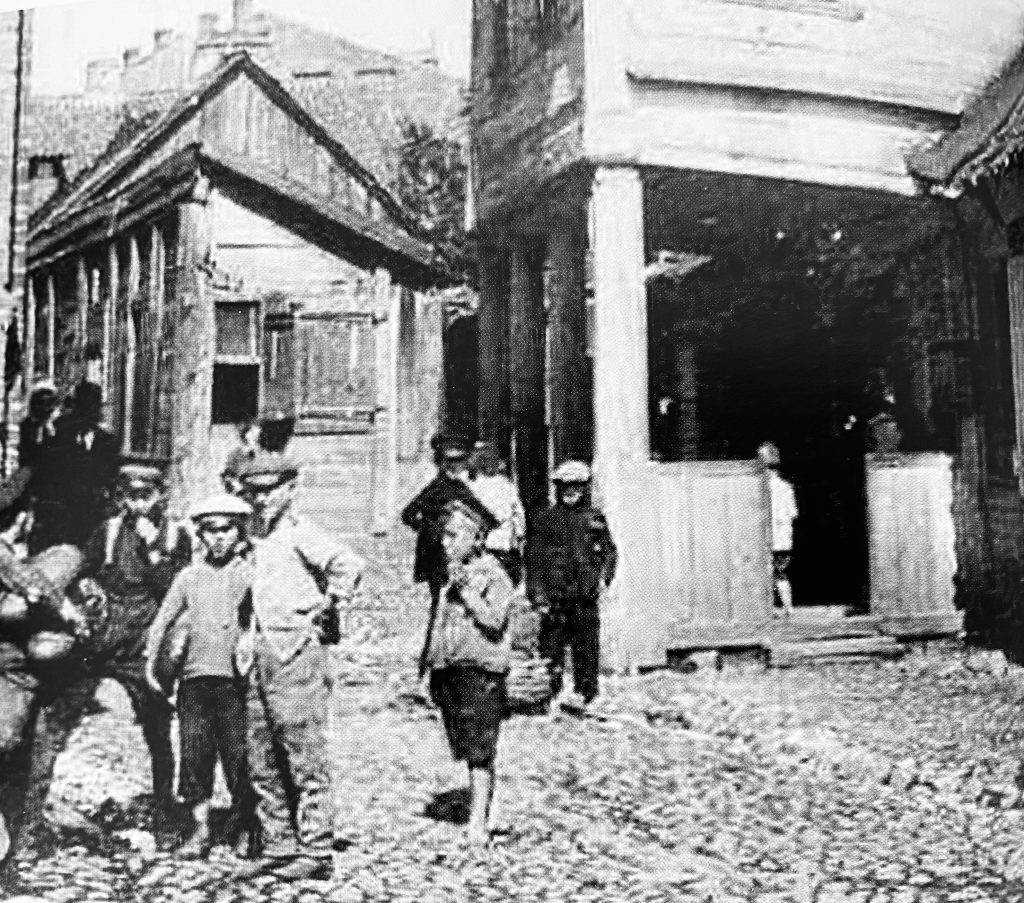
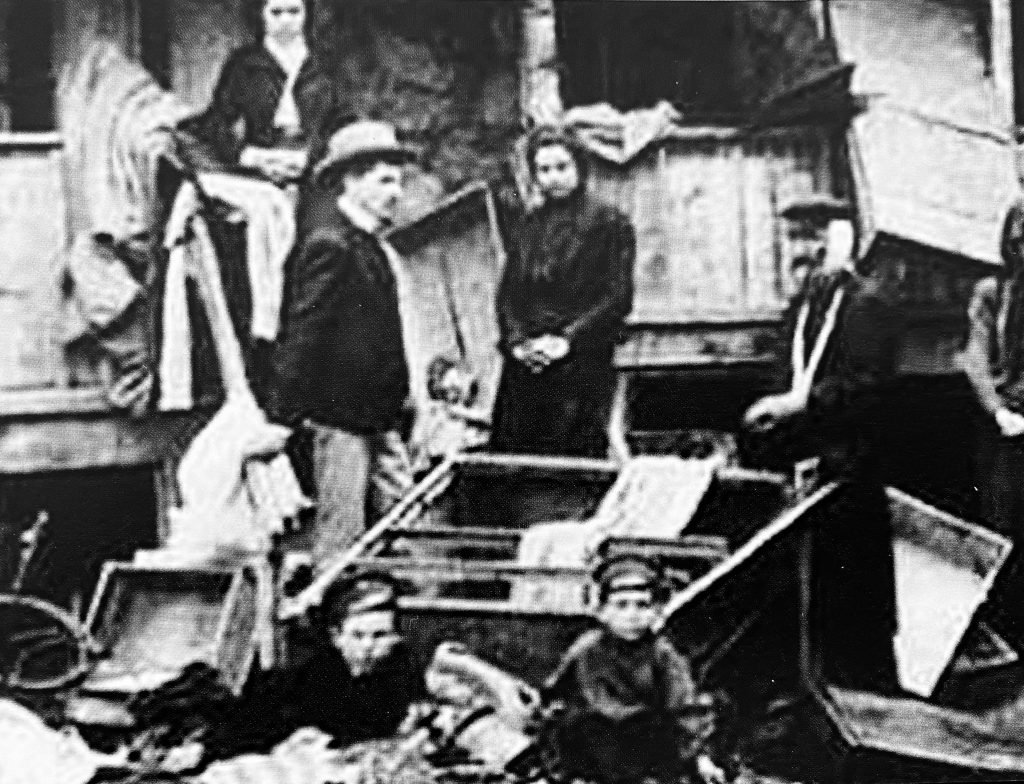

Yes, there is a controversy around Fiddler that it sanitizes life in the shtetl. I think people with our heritage (my background has a lot in common with yours, Laurie) can understand the nuances and how and why the story was fictionalized. Probably not so the general public. My grandmother, at age five or six, went to live with an aunt near Lviv and started doing domestic work. Unthinkable today.
So sad. They had tough lives with not much time for singing, dancing, or celebrating.
You brought a great description of your remembered performance, combined with some family history. And then you put it into a social and historical context. No Retrospecter could ask for more!
Thanks, Dale. It was interesting when that memory popped into my head, as I was struggling with the prompt. I was just visiting my family in Detroit and my brother confirmed after having watched a documentary on the making of Fiddler that it did have a pre-Broadway run in Detroit.
My parents saw that original production at the Fisher Theater, Laurie, but I was deemed too young to go. I bought the original cast album that year with prize money I earned from an essay contest from my temple (Emanu-El on 10 Mile Road in Oak Park). But my grandparents and their siblings wouldn’t go see it. It felt too close home, as they left Russia after the pogroms of 1906. So it must have been an interesting experience to be there with your grandparents; also from “the old country”. I, too, love the show, even if, as you say, it doesn’t fairly depict the true difficulties of their lives.
Though I’d seen student productions of the show, my husband and I finally saw a professional production just before the beginning of the pandemic. He was very moved by it and glad that he finally saw it. The Tevye was only fair, but it is so well-written, it didn’t matter. It was still a great experience.
Just back from a visit with my family in the Detroit area in which I confirmed some of the details of my memory (see comment to Dale). Our lives there had some overlap. Of course, I know Temple Emanu-El and was just on 10 Mile in Oak Park as we went from one family to another. It was the weekend of the Dream Cruise on Woodward. Remember that?
What a great story, sharing “Fiddler” with relatives who lived it. One who related to the music, the other who recalled the grim realities. It reminds us that there is more than one side to life, and also that people are incredibly resilient in part by using art. Pictures were wonderful. So sorry Annette is gone.
You nailed it, Khati. I was just in the Detroit area last weekend visiting family for the first time since before the pandemic. Got together with cousins and really felt Annette’s absence.
Laurie, I never felt Fiddler glorified shtetl life but of course I respect your grandfather’s first hand perspective .
My paternal grandparents came from the Ukraine at the turn of the century, earlier I assume than yours, and with different memories and perspective. When my aunt and uncle took my grandmother to the show she said, “Anatevka – it’s just like my village!”
I think my grandfather’s understanding of the English wasn’t great, but his life there had little joy. To him, it wasn’t how he remembered life in the shtetl and then in Riga as a tailor’s apprentice.
Great story, Laurie. I would have loved to see Fiddler with my grandparents, and wonder what they would have thought of it. I wouldn’t say it glamorizes life in the shtetl very much. I suppose at the end when the Russian constable tells them they have 3 days to leave, that was more “glamorous” than just killing all of them, but still pretty grim.
One of the roles my nephew played in the Yiddish Fiddler was the constable, so he had to learn to speak some Russian as well as Yiddish. He always enjoys telling people that he was the guy who threw the Jews out of Anatevka.
I don’t think my grandfather experienced any of the joyous moments portrayed in the play, and pogroms often resulted in death and destruction. I wish I could have taken them to the Yiddish show your nephew was in so they could have followed the plot better.
What a wonderful, moving story, Laurie, and cannot imagine anything more memorable. And yes; the show can be accused of somewhat glamorizing the shtetl, which is a fair point. But, of course, also understandable from a commercial standpoint. Arguably, “Oliver!” glamorized British workhouses, too. But thank you for sharing those pictures at the end of your story to bring up back to reality.
As I mentioned in an earlier story of my grandfather, I learned that he and family emigrated from Kviv to the US in 1905, the same year that “Fiddler” is supposed to have taken place. Also the year of the first Russian Revolution. Coincidence? Hardly. And sadly.
Thanks, John. My grandparents came a little later to escape the pogroms, poverty, and the army. I don’t think my grandfather could relate to the happier moments in Fiddler because I doubt he experienced much happiness until he came here. Of course, I understand why shtetl life needed to have great musical numbers, dancing, and a few laughs to make a Broadway show that would sell tickets. But I didn’t really get that as a kid and was surprised by my grandfather’s reaction